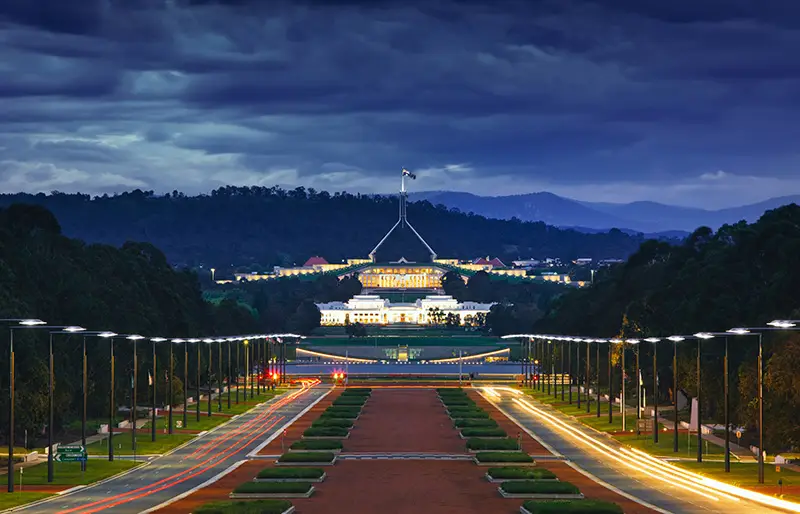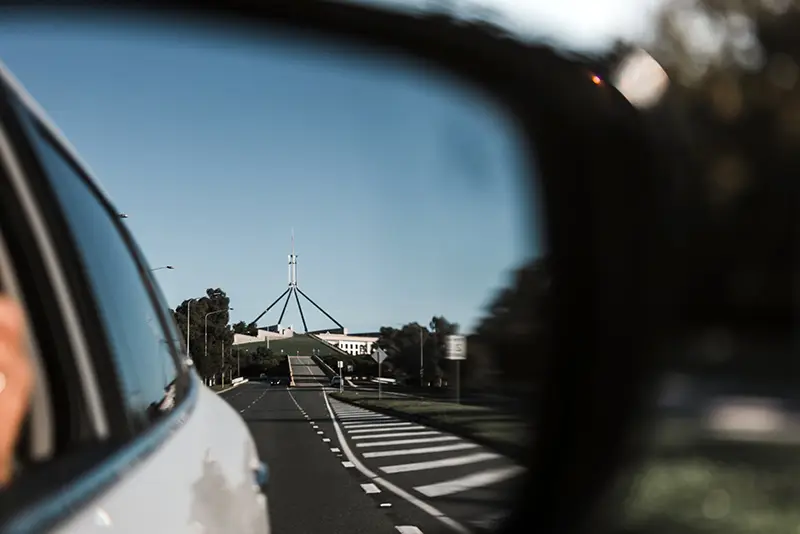Australia legalised medical cannabis nationwide, including the Australian Capital Territory (ACT), in 2016. Nonetheless, the specifics of this legislation differ from state to state. Staying informed about the most current laws and regulations concerning medical cannabis is crucial for patients, healthcare providers, and pharmacists. It encompasses areas such as workplace drug policies and treatment eligibility, ensuring that individuals have access to the most accurate and up-to-date information for well-informed decisions and compliance.
Is medical cannabis legal in the Australian Capital Territory?
Medical cannabis is legal in the Australian Capital Territory. In 2016, the government passed nationwide legislation allowing the prescription and consumption of medicinal cannabis. The ACT became the first jurisdiction in Australia to decriminalise the possession and use of small quantities of cannabis for medicinal purposes. Patients with a valid prescription from a registered medical practitioner are allowed to possess and use medicinal cannabis, and some regulations permit limited personal cultivation for patients or their caregivers.
Medical cannabis prescriptions in ACT
In the Australian Capital Territory, obtaining a medical cannabis prescription follows a structured process. Patients seeking this treatment must consult with a medical practitioner who is authorised to prescribe medicinal cannabis. The healthcare provider evaluates the patient’s medical condition and assesses whether medicinal cannabis is a suitable option. If it’s deemed appropriate, they may issue a prescription in compliance with ACT health regulations. Patients can then access medicinal cannabis through authorised suppliers or pharmacies. While the ACT has more relaxed regulations compared to some other Australian regions, obtaining a prescription still requires a valid medical need and approval from a qualified healthcare professional.

Medical cannabis supply in the Australian Capital Territory
The supply of medical cannabis in the ACT is regulated by the Medicinal Cannabis Scheme, which is governed by the Drugs of Dependence Act 1989 and the Drugs of Dependence Regulation 2002. These regulations establish the legal framework for the cultivation, manufacture, and supply of medicinal cannabis products in the ACT. Authorised suppliers and healthcare professionals are required to comply with these laws to ensure the safe and regulated supply of medicinal cannabis to patients with valid prescriptions. The regulations also outline the licensing and approval processes that govern the supply chain of medicinal cannabis products within the ACT.
Help is at Hand
Get free information and assistance quickly by filling out the contact form below.
Medical cannabis eligibility in the Australian Capital Territory
Eligibility and treatment choices in the ACT are the result of patient-doctor consultations. A qualified medical professional will assess your eligibility by conducting a thorough examination of your medical history and health status. If it is determined that your medical condition justifies the use of medical cannabis, your healthcare provider can proceed to apply to the TGA to secure approval for the prescription.
Medical cannabis in workplaces ACT
Medicinal cannabis products that include THC are typically classified as prohibited substances during or after work within many ACT workplaces. Consequently, your employment could be at risk if you use such products. Nevertheless, individual companies maintain distinct drug testing policies, and certain workplaces may permit specific medicinal cannabis products. It is advisable to initiate a conversation with your employer about your company’s drug policy before commencing any medical cannabis treatments. If your workplace exclusively forbids THC-containing products, you can consult your doctor regarding potential CBD-only alternatives to align with your workplace’s policy.
Travelling with medical cannabis in the Australian Capital Territory
When it comes to travelling with medical cannabis in the ACT, having your prescription with you is sufficient for most situations. However, if you intend to transport it across state lines, additional documentation is usually required. Regardless of the specific product, ensure your prescription remains in its original container and the pharmacy labels are both legible and intact during your journey. To enhance preparedness, you may also consider obtaining a letter from your doctor outlining your medication details, dosages, and the quantity you’re carrying. Some clinics offer patient cards that serve this purpose. Keep in mind that interstate access to your prescription might vary depending on the state’s regulations. When travelling abroad, it’s essential to thoroughly research the drug policies of your destination, as carrying cannabis, even with a prescription, could be illegal in other countries.

Driving with medical cannabis in ACT
Operating a vehicle with any level of THC in your system is prohibited in the Australian Capital Territory. THC’s potential impact on cognitive function makes driving or operating heavy machinery unsafe. It’s essential to remember that THC can remain in your system for several days. Currently, police roadside testing does not test for impairment, only for the presence of THC. While driving under the influence of CBD only treatments is allowed, it’s worth noting that many CBD products may contain THC if they were obtained illicitly online. If your daily routine relies on driving, such as commuting to work, it’s advisable to have a conversation with your healthcare provider regarding treatment alternatives, and ensure you source your prescription cannabis via legal pathways.
Medical cannabis cost in the Australian Capital Territory
The cost of medical cannabis in the Australian Capital Territory varies depending on several factors. One of the key considerations is that medical cannabis is not subsidised by the Pharmaceutical Benefits Scheme (PBS), which means patients bear the full cost. Prices can fluctuate based on the specific product, its form (e.g., oils, capsules), and the dosage required. Additionally, medical cannabis is not covered by private health insurance in most cases, making it essential for patients to budget for this medical expense when considering it as part of their treatment plan. However, some health insurers who do offer medicinal cannabis cover in the extras often don’t advertise this service, so check with your insurer to see what rebates you may be eligible for.
Medical cannabis pharmacies in ACT
In the ACT, patients with valid prescriptions can obtain medicinal cannabis from any licensed pharmacy. Medicinal cannabis products fall under the category of scheduled goods, which mandates that pharmacies adhere to stringent protocols in their handling. These procedures encompass strict requirements for storage and labelling, ensuring compliance with guidelines outlined by the Therapeutic Goods Administration (TGA) and the Pharmacy Board of Australia. The comprehensive regulations in place are designed to guarantee the safe and responsible distribution of medicinal cannabis to patients in the ACT, enhancing the overall quality and reliability of this healthcare option.
How does medical cannabis differ from recreational cannabis in the Australian Capital Territory?
In the Australian Capital Territory, the primary difference between medical and recreational cannabis lies in their legal status and purpose. Medical cannabis is permitted for therapeutic use under strict regulations, and patients require a valid prescription from a registered medical practitioner. Recreational cannabis, on the other hand, remains illegal for non-medical use. The ACT has decriminalised personal possession of small quantities of recreational cannabis, but it’s still a controlled substance, and selling or trading it for non-medical purposes is prohibited.
Contact Us For Free Assistance
"*" indicates required fields
Other state regulations
Medical cannabis is legal in New South Wales in medical and scientific situations. Doctors can prescribe it when necessary with TGA approval. The government has also established the Centre for Medicinal Cannabis Research and Innovation to conduct community education and keep track of clinical trials.
Medical Cannabis in NSWIn the Northern Territory, medicinal cannabis is legal with a prescription. In November 2019, the first NT resident received a medicinal cannabis prescription. However, many patients in the NT will need to find a telehealth doctor in another state because there are few authorised prescribers based locally, and the area’s remote nature makes it difficult for residents to travel to the right doctors.
Medical Cannabis in NTRegistered medical practitioners are allowed to prescribe medicinal cannabis in Queensland if it’s medically necessary. In the past, they had to get approval from the Commonwealth. However, new legislation in 2020 determined that any Queensland medical practitioner could prescribe Schedule 4 CBD or Schedule 8 THC or CBD oil without approval from health authorities.
Medical Cannabis in QLDYou can get medicinal cannabis in South Australia with a prescription. The prescription needs to come from an authorised SA medical practitioner. In some cases, the practitioner must seek approval under South Australian Controlled Substances legislation. This approval is subject to exceptions such as elderly people or terminally ill patients.
Medical Cannabis in SAMedical practitioners can prescribe medicinal cannabis in Tasmania if they feel it’s the best course of treatment for a patient. To do this, they must acquire approval from the Commonwealth and state authorities.
Medical Cannabis in TASIn the state of Victoria, medicinal cannabis is legal when prescribed by a doctor or nurse practitioner, usually with Commonwealth or state approval. Medicinal cannabis is prescribed when the doctor feels it will be beneficial to the patient. Beginning in 2022, practitioners can prescribe Schedule 8 medicinal cannabis to non-drug dependent patients without a Schedule 8 treatment permit.
Medical Cannabis in VICPrescriptions for medicinal cannabis can be given by any prescriber in WA if they have the appropriate government approval. Prescriptions need to align with the Medicines and Poisons legislation. As long as a WA-based medical practitioner provides your prescription, it can be dispensed at any pharmacy in the state.
Medical Cannabis in Perth & WA